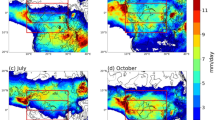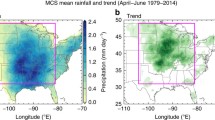Abstract
Principal characteristics of summer mesoscale convective systems in the Yucatan Peninsula, Mexico, were studied using three years of radar imagery. MCSs occurred almost daily in this region, having a minimum monthly during July and August, coinciding with the Midsummer Drought. MCS movements were mostly from E, NE, and SE directions, with a mean propagation speed of 6.0 ms−1. They had a mean duration of 6.4 h, with initiation time around the afternoon and dissipation time around midnight. The most crucial synoptic forcing that influenced MCSs formation in this region was the trough, precisely a local type called Mayan trough, followed by tropical waves and unclassifiable synoptic. Inactive periods of MCSs formation related to a Caribbean low-level jet stronger than average. The organization of MCSs convection showed that half of them had a linear pattern with an N-S orientation of convective lines, and their organization was normal or parallel to the MCS orientation. Mesoscale phenomena like sea breezes significantly influence the formation of MCSs in this region.

Source: Servicio Meteorologico Nacional











Similar content being viewed by others
Availability of data and material
It will be provided upon request to the author.
Code availability
A trial license of IDL© programming language version 8.7.3 (Harris Geospatial Solutions Inc) was used to track MCSs.
References
Alexander GD, Young GS (1992) The relationship between EMEX mesoscale precipitation feature properties and their environmental characteristics. Mon Wea Rev. https://doi.org/10.1175/1520-0493(1992)120%3c0554:TRBEMP%3e2.0.CO;2
Biasutti M, Yuter SE, Burleyson CD, Sobel A (2011) Very high-resolution rainfall patterns measured by TRMM precipitation radar: seasonal and diurnal cycles. Climate Dyn. https://doi.org/10.1007/s00382-011-1146-6
Cahuich-Lopez M, Mariño-Tapia I, Sousa A, Gold-Bouchot G, Cohen M, Valdés-Lozano D (2020) Spatial and temporal variability of sea breezes and synoptic influences over the surface wind field of the Yucatán Peninsula. Atmosfera. https://doi.org/10.20937/ATM.52713
Dalal S, Lohar D, Sarkar S, Sadhukhan I, Debnath GC (2012) Organizational modes of squall-type Mesoscale Convective Systems during premonsoon season over eastern India. Atmos Res. https://doi.org/10.1016/j.atmosres.2011.12.002
Diro GT, Rauscher SA, Giorgi F, Tompkins AM (2012) Sensitivity of seasonal climate and diurnal precipitation over Central America to land and sea surface schemes in RegCM4. Clim Res. https://doi.org/10.3354/cr01049
Geerts B (1998) Mesoscale convective systems in the southeast United States during 1994–95: a survey. Weather Forecast. https://doi.org/10.1175/1520-0434(1998)013%3c0860:MCSITS%3e2.0.CO;2
Kikuchi K, Wang B (2008) Diurnal precipitation regimes in the global tropics. J Climate. https://doi.org/10.1175/2007JCLI2051.1
Kucienska B, Raga GB, Romero-Centeno R (2012) High lightning activity in maritime clouds near Mexico. Atmos Chem Phys. https://doi.org/10.5194/acp-12-8055-2012
Le Mone MA, Zipser EJ, Trier SB (1998) The role of environmental shear and thermodynamic conditions in determining the structure and evolution of mesoscale convective systems during TOGA COARE. J Atmos Sci 55:3493–3518
Liu C, Zipser EJ (2009) “Warm Rain” in the Tropics: Seasonal and Regional Distributions Based on 9 yr of TRMM Data. J Climate. https://doi.org/10.1175/2008JCLI2641.1
Liu C, Zipser EJ (2013) Regional variation of morphology of organized convection in the tropics and subtropics. J Geophys Res Atmos. https://doi.org/10.1029/2012JD018409
Machado L, Rossow W, Guedes W, Walker A (1998) Life cycle variations of mesoscale convective systems over the americas. Mon Wea Rev. https://doi.org/10.1175/1520-0493(1998)126%3c1630:LCVOMC%3e2.0.CO;2
Macias J, Avendaño A (2014) Climatologia de tornados en Mexico. Boletin De Investigaciones Geograficas 83:74–87 (in spanish)
Magaña V, Amador J, Medina S (1999) The midsummer drought over Mexico and Central America. J Climate. https://doi.org/10.1175/1520-0442(1999)012%3c1577:TMDOMA%3e2.0.CO;2
Mesinger F, DiMego G, Kalnay E, Mitchell K et al (2006) North American Regional Reanalysis. Bull Amer Meteor Soc. https://doi.org/10.1175/BAMS-87-3-343
Muñoz E, Busalacchi A, Nigam S, Ruiz-Barradas A (2008) Winter and summer structure of the caribbean low-level jet. J Climate. https://doi.org/10.1175/2007JCLI1855.1
Parker MD, Johnson RH (2000) Organizational modes of midlatitude mesoscale convective systems. Mon Wea Rev. https://doi.org/10.1175/1520-0493(2001)129%3c3413:OMOMMC%3e2.0.CO;2
Punkka A, Bister M (2005) Occurrence of summertime convective precipitation and mesoscale convective systems in Finland during 2000–01. Mon Wea Rev. https://doi.org/10.1175/MWR-2854.1
Raga GB, de la Parra MG, Kucienska B (2014) Deaths by lightning in Mexico (1979–2011): threat or vulnerability? Wea Climate Soc. https://doi.org/10.1175/WCAS-D-13-00049
Reeder MJ, Smith RK, Taylor JR, Low DJ, Arnup SJ, Muir L, Thomsen G (2013) Diurnally forced convergence lines in the Australian Tropics. Q J R Meteorol Soc. https://doi.org/10.1002/qj.2021
Rigo T, Llasat MC (2007) Analysis of mesoscale convective systems in Catalonia using meteorological radar for the period 1996–2000. Atmos Res. https://doi.org/10.1016/j.atmosres.2005.10.016
Tian B, Held IM, Lau NC, Soden BJ (2005) Diurnal cycle of summertime deep convection over North America: a satellite perspective. J Geophys Res. https://doi.org/10.1029/2004JD005275
Valdés-Manzanilla A, Barradas VL (2012) Mesoscale Convective Systems during NAME. Atmósfera 22:155–170
Valdés-Manzanilla A, Cortez M, Pastrana F (2005) Un estudio explorativo de los sistemas convectivos de mesoescala de México. Boletin De Investigaciones Geograficas 56:26–42 (in spanish)
Valdés-Manzanilla A, Aparicio FJ (1997) The Mexican Doppler radar network, Preprints of 28th Conference on radar meteorology, Austin Texas, USA, Amer Met Soc, pp 35–36
Acknowledgements
The author wants to thank Servicio Meteorólogico Nacional of Mexico for sharing vital information used during this research and to Universidad Juarez Autónoma de Tabasco for giving time to carry out this study. Furthermore, the author wants to thank Harris Geospatial Solutions Inc. for using a trial license of the IDL programming language. Finally, this researcher wants to thank Gaspar Lopez Ocaña for his advice.
Funding
This study received funding from CONACYT through the project # 309503 called “Climatología de los sistemas convectivos de mesoescala en el sureste de México usando imágenes de radar meteorológico”.
Author information
Authors and Affiliations
Corresponding author
Ethics declarations
Conflict of interest
The author declares that he has no conflict of interest.
Additional information
Publisher's Note
Springer Nature remains neutral with regard to jurisdictional claims in published maps and institutional affiliations.
Rights and permissions
About this article
Cite this article
Valdés-Manzanilla, A. A provisional climatology of the mesoscale convective systems in the Yucatan Peninsula in summer. Nat Hazards 110, 207–223 (2022). https://doi.org/10.1007/s11069-021-04943-y
Received:
Accepted:
Published:
Issue Date:
DOI: https://doi.org/10.1007/s11069-021-04943-y




